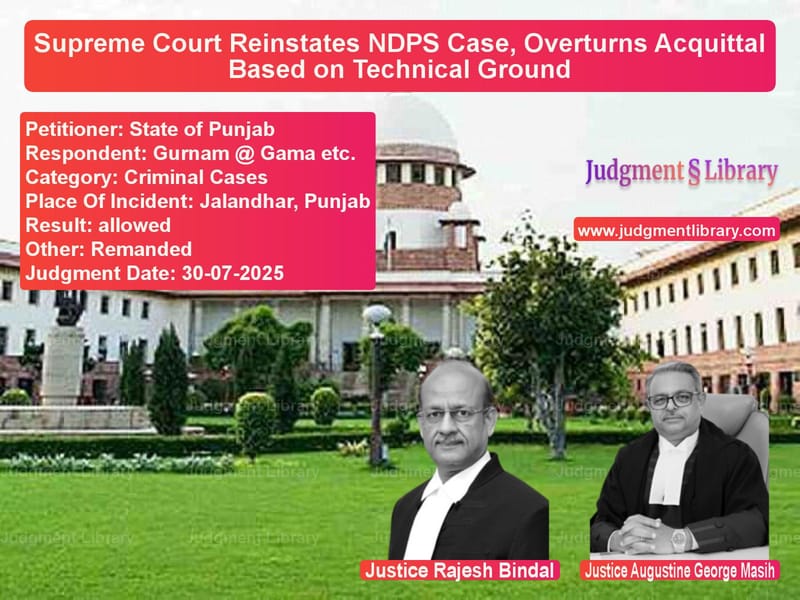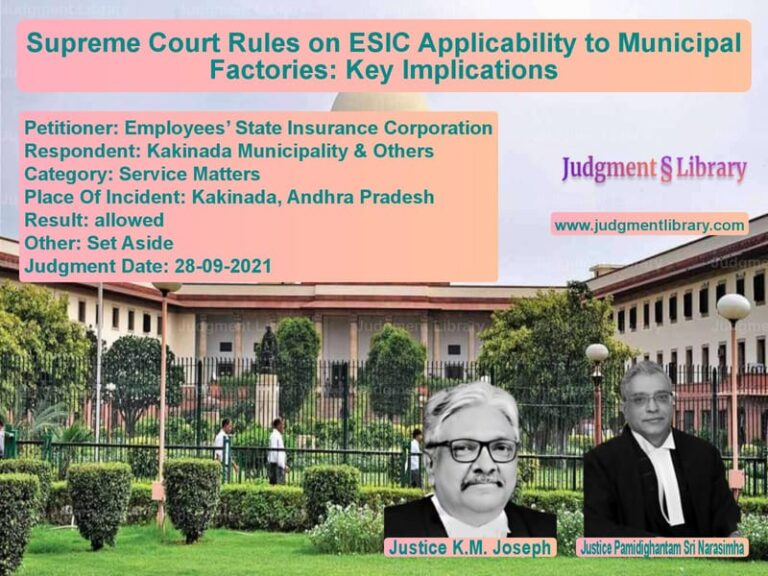Supreme Court Reinstates NDPS Case, Overturns Acquittal Based on Technical Ground
In a significant development that underscores the importance of substantive justice over technicalities, the Supreme Court of India has reinstated a major narcotics case that had been dismissed on a procedural technicality. The case involves the State of Punjab appealing against the acquittal of two individuals, Gurnam @ Gama and Jaswinder Singh, who had been convicted for possessing 750 kilograms of poppy husk but were later acquitted by the Punjab and Haryana High Court based on a legal technicality that has since been overruled.
The legal journey of this case spans over 16 years, beginning with an intelligence tip received on September 20, 2009, about the transportation of narcotics. Acting on this information, police intercepted a truck bearing registration number PIX 0146. Gurnam Singh alias Gama was found sitting on a stack of bags in the cargo portion, while Jaswinder Singh was driving the vehicle. Upon search, authorities recovered 750 kilograms of poppy husk along with two motorcycles, leading to the registration of FIR No. 221 of 2009 under the Narcotic Drugs and Psychotropic Substances (NDPS) Act.
After a full trial, the Special Court in Jalandhar convicted both accused on December 11, 2010, sentencing them to rigorous imprisonment for 12 years and imposing a fine of ₹1,00,000 each. The conviction was based on substantial evidence gathered during the investigation and presented during the trial.
The High Court’s Controversial Acquittal
The convicted individuals appealed to the Punjab and Haryana High Court, which in December 2018 delivered a surprising verdict. Without examining the merits of the case or the evidence presented during trial, the High Court acquitted both respondents solely relying on the Supreme Court’s judgment in Mohan Lal v. State of Punjab. This 2018 judgment had held that fair investigation requires that the informant and investigator must not be the same person, as it could compromise the impartiality of the investigation.
The High Court’s decision to acquit without considering the actual evidence or circumstances of the case became the central point of contention before the Supreme Court. The State of Punjab argued that this approach reduced criminal justice to a mere technical exercise, ignoring the substantive evidence of guilt.
The State’s Arguments Before Supreme Court
The appellant-State of Punjab presented compelling arguments before the Supreme Court. The state’s counsel highlighted that after the Mohan Lal judgment, a three-judge bench in Varinder Kumar v. State of H.P. had clarified that pending criminal prosecutions, trials, and appeals prior to the Mohan Lal judgment should continue to be governed by the individual facts of each case.
More significantly, the state counsel pointed to the Constitution Bench judgment in Mukesh Singh v. State (Narcotics Branch of Delhi) delivered on August 31, 2020, which had specifically overruled the Mohan Lal principle. The Constitution Bench had held that “In a case where the informant himself is the investigator, by that itself cannot be said that the investigation is vitiated on the ground of bias or the like factor. The question of bias or prejudice would depend upon the facts and circumstances of each case. Therefore, merely because the informant is the investigator, by that itself the investigation would not suffer the vice of unfairness or bias and therefore on the sole ground that informant is the investigator, the accused is not entitled to acquittal.”
The state also presented startling information about the criminal antecedents of respondent Gurnam @ Gama, showing a pattern of involvement in narcotics cases. According to the list produced before the Court, Gurnam had been involved in 14 criminal cases, including 7 under the NDPS Act. He had been convicted in 5 cases, acquitted in 3, and had 2 cases still pending trial. Two of the pending cases under the NDPS Act were registered after his acquittal in the present case, suggesting continued involvement in narcotics trade.
The Defense’s Counter-Arguments
The respondents’ senior counsel raised two primary defenses. First, he argued that at the time the High Court decided the appeals in December 2018, the Mohan Lal judgment was the prevailing law, and therefore the acquittal based on this principle was legally sound. He contended that subsequent judicial opinions cannot have retrospective operation to invalidate earlier decisions.
Second, he strongly objected to the state producing details of Gurnam’s criminal antecedents in court, arguing that these documents had not been furnished along with any affidavit and therefore could not be relied upon. The defense maintained that the High Court’s acquittal should stand based on the legal position as it existed at the time of the decision.
The Supreme Court’s Landmark Ruling
The Supreme Court, comprising Justices Rajesh Bindal and Augustine George Masih, delivered a comprehensive judgment that balanced legal principles with the demands of substantive justice. The Court began by noting that the High Court had acquitted the respondents without considering or appreciating the evidence led before the Trial Court, relying solely on the legal principle from Mohan Lal’s case.
The Court extensively quoted from the subsequent judgments that had clarified and ultimately overruled the Mohan Lal principle. Particularly significant was the Court’s reference to the three-judge bench decision in Varinder Kumar’s case, which had stated: “The criminal justice delivery system, cannot be allowed to veer exclusively to the benefit of the offender making it unidirectional exercise. A proper administration of the criminal justice delivery system, therefore, requires balancing the rights of the accused and the prosecution, so that the law laid down in Mohan Lal is not allowed to become a springboard for acquittal in prosecutions prior to the same, irrespective of all other considerations. We, therefore, hold that all pending criminal prosecutions, trials and appeals prior to the law laid down in Mohan Lal shall continue to be governed by the individual facts of the case.”
The Supreme Court rejected the defense argument about retrospective application, holding that “Courts only interpret law and do not enact law. In the case in hand, the judgment of Mohan Lal’s case prevailed when the High Court decided the appeals. However, thereafter, the matter is pending in this Court and since appeals are continuation of proceedings, the law as available today is to be applied.”
This reasoning underscores a fundamental principle of appellate jurisdiction – that higher courts must apply the law as it exists at the time of their decision, not as it existed when the lower court decided the case.
Broader Implications for Criminal Justice
The Supreme Court’s judgment carries significant implications for the criminal justice system in India. First, it reinforces that technicalities should not override substantive justice, especially in serious cases involving narcotics trafficking. The recovery of 750 kilograms of poppy husk represents a substantial quantity of contraband, and the Court recognized that acquittal on a purely technical ground without examining the evidence would be a miscarriage of justice.
Second, the judgment clarifies the evolving legal position on the separation of informant and investigator roles. While the Mohan Lal judgment had created an absolute bar, the subsequent Constitution Bench in Mukesh Singh’s case adopted a more nuanced approach, recognizing that the mere fact that the informant and investigator are the same does not automatically vitiate the investigation. The question of bias must be examined based on the facts and circumstances of each case.
Third, the Court’s willingness to consider the criminal antecedents of the accused, though not forming the basis of the decision, indicates a holistic approach to criminal adjudication. The pattern of repeated involvement in similar offenses, while not proof of guilt in the present case, provides context for understanding the accused’s conduct and the seriousness of the allegations.
Case Remanded for Fresh Consideration
The Supreme Court allowed the State’s appeals and set aside the High Court’s acquittal. However, recognizing that the High Court had not examined the merits of the case, the Supreme Court remanded the matter back to the High Court for fresh consideration on merits. The Court specifically requested the High Court to expedite the hearing, noting that the appeals pertain to the year 2010.
This disposition strikes a careful balance – while correcting the legal error in the High Court’s approach, it ensures that the accused will still have their day in court for a proper consideration of the evidence against them. The merits of the case, including the strength of the prosecution evidence and any defenses available to the accused, will now be properly examined by the High Court.
The Supreme Court’s judgment represents a significant course correction in the administration of criminal justice. By emphasizing that technical grounds should not override substantive justice, especially in serious cases involving organized narcotics trafficking, the Court has reinforced the principle that the criminal justice system must balance the rights of the accused with the interests of society in preventing and punishing serious crimes. The case now returns to the High Court for a proper examination on merits, ensuring that justice is done through a careful consideration of evidence rather than technical legal arguments.
Petitioner Name: State of Punjab.Respondent Name: Gurnam @ Gama etc..Judgment By: Justice Rajesh Bindal, Justice Augustine George Masih.Place Of Incident: Jalandhar, Punjab.Judgment Date: 30-07-2025.Result: allowed.
Don’t miss out on the full details! Download the complete judgment in PDF format below and gain valuable insights instantly!
Download Judgment: state-of-punjab-vs-gurnam-@-gama-etc.-supreme-court-of-india-judgment-dated-30-07-2025.pdf
Directly Download Judgment: Directly download this Judgment
See all petitions in Drug Possession Cases
See all petitions in Judgment by Rajesh Bindal
See all petitions in Judgment by Augustine George Masih
See all petitions in allowed
See all petitions in Remanded
See all petitions in supreme court of India judgments July 2025
See all petitions in 2025 judgments
See all posts in Criminal Cases Category
See all allowed petitions in Criminal Cases Category
See all Dismissed petitions in Criminal Cases Category
See all partially allowed petitions in Criminal Cases Category







